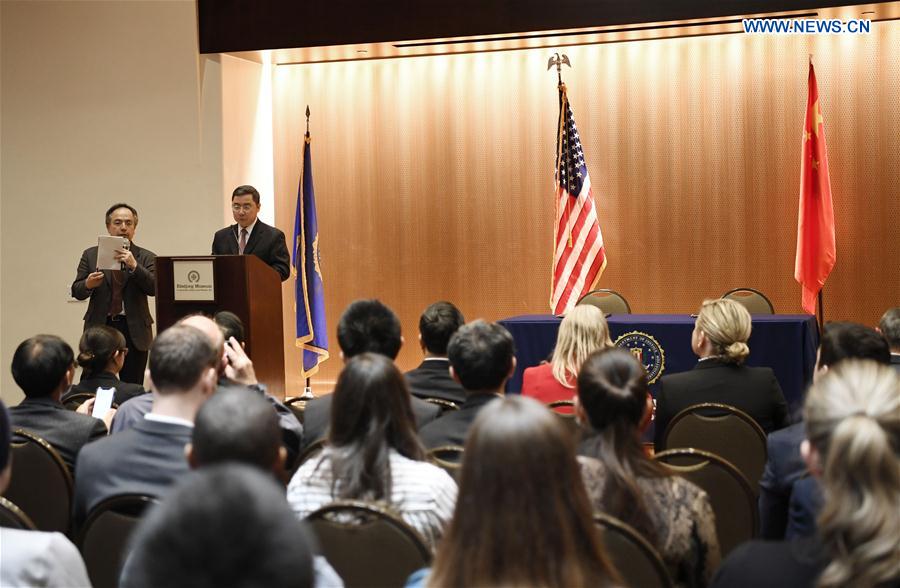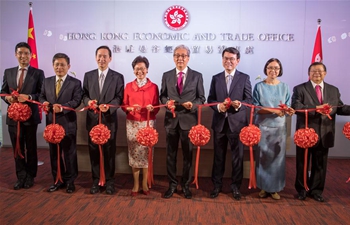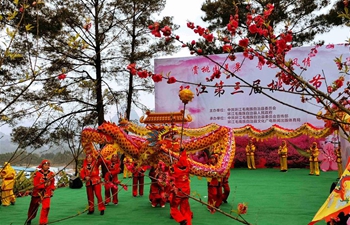 ?
?Minister of the Chinese Embassy to the United States Li Kexin (R) speaks during a repatriation event held in the Eiteljorg Museum of Indianapolis, capital city of state of Indiana, the United States, on Feb. 28, 2019. The United States announced the repatriation of 361 pieces of Chinese relics and artifacts to China at a ceremony on Thursday. (Xinhua/Liu Jie)
INDIANAPOLIS, the United States, Feb. 28 (Xinhua) -- In another sign of increasing cultural exchange, the United States announced the repatriation of 361 pieces of Chinese relics and artifacts to China at a ceremony here on Thursday.
Senior officials of the two countries celebrated the repatriation at an event held in the Eiteljorg Museum in Indianapolis, capital city of the U.S. state of Indiana, where 20 pieces of relics and artifacts were on display, attracting some 100 visitors.
The repatriation will bring back to China the largest batch of relics and artifacts from the United States since 2009, when the two nations signed a memorandum of understanding (MoU) to enhance cooperation in this regard, according to Chinese officials.
Also at the event, officials from China's National Cultural Heritage Administration and U.S. Federal Bureau of Investigation (FBI) signed and exchanged Certificate of Transfer, which formalizes the transfer of custody from the United States to China regarding these cultural relics and artifacts.
Hu Bing, deputy administrator of China's National Cultural Heritage Administration, said at the ceremony that these relics and artifacts are an inseparable part of China's cultural heritage.
Hu said that the repatriation is the fruit of the long-term cooperation between the United States and China, and will further enhance the trust and understanding between the two peoples, as the two nations celebrate the 40th anniversary of their bilateral diplomatic ties.
The Chinese senior official added that the repatriation will also set a great example for global relics preservation efforts as it represents respect for international rules as well as for native nations' culture and history.
China appreciates U.S. efforts in relics repatriation, and expects further cooperation with the U.S. side on relics preservation and information sharing, law enforcement against looting and smuggling, as well as people-to-people exchange, so as to help promote more fair international practices and facilitate global cultural exchanges, he added.
Minister of the Chinese Embassy in the United States Li Kexin also hailed the U.S. commitment, extending "special appreciation" to the FBI and the U.S. State Department for their cooperation with China and hard work to repatriate the relics and artifacts to their native country.
"You have shown the best virtue of integrity of the American people," he said, adding "I believe this must have been done with tremendous efforts, for its scale and complexity."
"This repatriation is a good example and a gift to the 40th anniversary of the diplomatic relations between China and the United States. I believe it will resonate very positively in China," he added.
The Chinese officials told Xinhua that these repatriated relics and artifacts, found by the FBI's Indianapolis office in April 2014, were allowed to be sent back to China thanks to the five-year cooperation among the U.S. State Department, the FBI, China's National Cultural Heritage Administration and Embassy in the United States.
The repatriation is the first of its kind since the two countries re-signed the MoU in January this year, and the third-time effort since China and the United States first signed the document in 2009.
In recent years, China's National Cultural Heritage Administration has worked and secured the return of over 4,000 pieces of relics through diplomatic, judicial and consultation channels, among others.
The repatriation of China's relics and artifacts marks the U.S.-China win-win collaboration in this regard, U.S. officials, including U.S. Deputy Assistant Secretary of State for Policy Aleisha Woodward and chief of FBI's Transnational Organized Crime Section, Kristi Johnson, said at the ceremony.
The U.S. side will continue its partnership with China in accordance with the MoU, so as to contribute to the preservation of cultural heritage shared by all human beings, they added.











